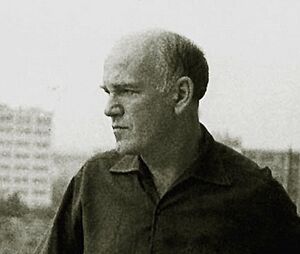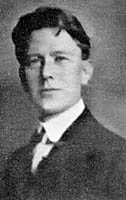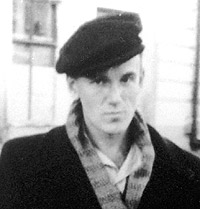Sviatoslav Richter facts for kids
Sviatoslav Richter (born March 20, 1915 – died August 1, 1997) was a famous Soviet classical pianist. Many people think he was one of the greatest pianists ever. He was known for how deeply he understood music, his amazing playing skills, and the huge number of pieces he could play.
Contents
About Sviatoslav Richter
Richter's Early Life
Sviatoslav Richter was born in Zhytomyr, which is now part of Ukraine. His parents were also from there. His father, Teofil Richter, was a pianist, organist, and composer. He was born to German families living abroad. His mother, Anna Pavlovna Richter, came from a noble Russian family. She even studied music with her future husband.
In 1918, during the Russian Civil War, Richter's parents were separated from him. He went to live with his aunt Tamara until 1921. During this time, he first became interested in art, especially painting, which his aunt taught him.
In 1921, his family reunited and moved to Odessa. There, his father taught at the Odessa Conservatory. In the early 1920s, Richter became very interested in music, as well as movies, books, and theater. He started learning piano, mostly by teaching himself. His father and a Czech harpist gave him only basic music lessons.
Even when he was young, Richter was excellent at sight-reading music. He often practiced with local opera and ballet groups. He loved opera and vocal music throughout his life. At age 15, he started working at the Odessa Opera and Ballet Theater, where he played piano for rehearsals.
Starting His Music Career
Richter gave his first public concert on March 19, 1934, in Odessa. But he didn't start formal piano lessons until three years later. He decided to study with Heinrich Neuhaus, a famous pianist and teacher, at the Moscow Conservatory. During Richter's audition, Neuhaus was so impressed that he reportedly whispered, "This man's a genius." Neuhaus taught many great pianists, but he thought Richter was the "genius pupil" he had always waited for. He even said he taught Richter "almost nothing."
Early on, Richter also tried writing his own music. He even played some of his compositions during his audition for Neuhaus. However, he stopped composing soon after moving to Moscow. Years later, he explained that he saw "no point in adding to all the bad music in the world."
By the start of World War II, his parents' marriage had ended. His father was German, which made him suspicious to the authorities. A plan was made for the family to leave the country. However, his mother chose to stay in Odessa. In August 1941, his father was arrested and later died. Richter did not speak to his mother again until almost 20 years later.
In 1943, Richter met Nina Dorliak, an opera singer. They became living companions around 1945 and stayed together until Richter's death. They did not have any children. Nina supported Richter in his personal life and career, and she was with him during his final illness.
Becoming Famous Worldwide
In 1949, Richter won the USSR State Prize. This award helped him go on many concert tours in Russia, Eastern Europe, and China. He gave his first concerts outside the Soviet Union in Czechoslovakia in 1950. In 1952, Richter was asked to play the role of Franz Liszt in a Soviet film called The Composer Glinka.
On February 18, 1952, Richter conducted an orchestra for the first and only time. He led the world premiere of Prokofiev's Symphony-Concerto for Cello and Orchestra, with Mstislav Rostropovich playing the cello solo.
In April 1958, Richter was a judge at the first Tchaikovsky Competition in Moscow. He was so moved by Van Cliburn's performance of Rachmaninoff's Third Piano Concerto that he cried with joy. He gave Cliburn a perfect score.
In 1960, Richter showed his independence by performing at the funeral of Boris Pasternak, even though he was known for not getting involved in politics. After receiving important awards like the Stalin and Lenin prizes, he began his first concert tours in the US in 1960, and in England and France in 1961.
Concert Tours and Recordings
Richter's first concerts in the West were in Finland in May 1960. On October 15, 1960, he played in Chicago, performing Brahms's Second Piano Concerto. It was a huge success. A music critic from the Chicago Tribune described how Richter seemed shy at first but then played "the performance of a lifetime." Richter's 1960 US tour ended with several concerts at Carnegie Hall in New York.
Richter did not enjoy performing in the United States. After an incident in 1970 at Carnegie Hall, where his concert was interrupted by anti-Soviet protests, Richter promised never to return.
In 1961, Richter played in London for the first time. His first concert there received some negative reviews. However, after a concert on July 18, 1961, where he played two of Liszt's piano concertos, the critics changed their minds and praised him.
In 1963, Richter found a perfect place in France for a music festival called La Grange de Meslay. This festival became an annual event. In 1970, Richter visited Japan for the first time. He traveled by train and ship because he disliked flying. He played many different composers and visited Japan eight times.
Later Years and Legacy
Richter loved performing for an audience, but he didn't like planning concerts years in advance. Later in his life, he often played concerts with very short notice in small, often darkened halls. Only a small lamp would light his music. Richter said this helped the audience focus on the music itself, rather than on him.
In 1981, Richter started the international December Nights music festival at the Pushkin Museum in Moscow. After his death in 1997, the festival was renamed December Nights of Sviatoslav Richter.
In 1986, Richter went on a six-month tour of Siberia with his favorite Yamaha piano. He gave about 150 concerts, sometimes playing in small towns that didn't even have a concert hall. It is said that after one concert, the audience, who had never heard classical music live before, gathered and swayed to celebrate his playing.
Richter continued to perform some of the most difficult piano pieces even in 1995. These included works by Ravel, Prokofiev, Chopin, and Schumann. His last recorded performance with an orchestra was in 1994, playing three Mozart concertos.
Richter's very last concert was a private gathering in Lübeck, Germany, on March 30, 1995. He played pieces by Haydn and Reger.
Richter died in Moscow on August 1, 1997, at the age of 82, from a heart attack. He had been feeling sad because changes in his hearing made it hard for him to perform.
What Richter Played (Repertoire)
Richter once said, "My repertory runs to around eighty different programs, not counting chamber works." This means he knew and could play about 80 different sets of music. His repertoire included music from many composers, from Handel and Bach to more modern composers like Bartók and Gershwin.
Richter worked very hard to learn new pieces. For example, in the late 1980s, he learned difficult pieces by Brahms. In the 1990s, he learned new pieces by Debussy, Gershwin, Bach, and Mozart.
Some of the most important composers in his repertoire were Schubert, Schumann, Beethoven, Bach, Chopin, Liszt, Prokofiev, and Debussy. He was so dedicated that he reportedly learned and memorized the second book of Bach's The Well-Tempered Clavier in just one month.
He was the first to perform Prokofiev's Seventh Piano Sonata, which he learned in only four days. Prokofiev even dedicated his Ninth Piano Sonata to Richter. Besides his solo career, Richter also played chamber music with other famous musicians like Mstislav Rostropovich (cello) and David Oistrakh (violin). He also often played with singers, including his wife, Nina Dorliak.
Richter also conducted the first performance of Prokofiev's Symphony-Concerto for cello and orchestra. This was the only time he ever conducted. The cello soloist was Rostropovich, to whom the piece was dedicated.
Richter's Way of Performing
Richter believed that a musician should "carry out the composer's intentions to the letter." This means he thought performers should play the music exactly as the composer wrote it, without adding anything extra. He felt that a talented musician helps the audience understand the true meaning of the music. He believed the performer should not try to be more important than the music itself.
Because of this belief, Richter was very critical of himself and sometimes of others. Once, after a concert where a pianist played a Chopin sonata without repeating a section, Richter asked him why he left it out. Another time, Richter realized he had been playing a wrong note in Bach's Italian Concerto for decades. He was so upset that he insisted a special apology be printed on a CD of his performance, explaining his mistake.
Richter's Recordings
Even though he has many recordings, Richter didn't like making them in a studio. Most of his recordings come from live concerts. His live performances from cities like Moscow (1948), Warsaw (1954), New York City (1960), and Prague are considered some of the best examples of his playing.
Some of his most famous live recordings include pieces by Scriabin, Schumann's C major Fantasy, Beethoven's Appassionata Sonata, and Liszt's B minor Sonata.
Despite his dislike for studios, Richter took recording very seriously. For example, after a long session recording Schubert's Wanderer Fantasy, he listened to it and decided to re-record it on a different piano because he wasn't happy with the first try. For Schumann's Toccata, he reportedly played the piece many times in a row without breaks to keep the performance fresh and spontaneous.
In 1961, Richter's recording of Brahms's Second Piano Concerto with the Chicago Symphony Orchestra won a Grammy Award. This recording is still considered very important, even though Richter himself wasn't completely satisfied with it.
Richter in Film
Richter appeared in a 1952 Soviet film called The Composer Glinka. In the movie, he played the role of the composer Liszt.
Awards and Honours
Sviatoslav Richter received many awards and honours during his life, including:
- State Stalin Prize (1950)
- People's Artist of the RSFSR (1955)
- Grammy Award (1960)
- Lenin Prize (1961)
- People's Artist of the USSR (1961)
- Robert Schumann Prize of the City of Zwickau (1968)
- Hero of Socialist Labour (1975)
- Three Orders of Lenin (1965, 1975, 1985)
- Order of the October Revolution (1980)
- Léonie Sonning Music Prize (1986; Denmark)
- Glinka State Prize of the RSFSR (1987)
- Order of Merit for the Fatherland, 4th class (1995)
- Russian Federation State Prize (1996)
- Commander of the Order of Arts and Letters (France)
- Honorary Doctorates from the University of Strasbourg and Oxford University
- Voted into the Gramophone Hall of Fame in 2012
- A minor planet, 9014 Svyatorichter, was named after him.
Images for kids
See also
 In Spanish: Sviatoslav Richter para niños
In Spanish: Sviatoslav Richter para niños
 | Valerie Thomas |
 | Frederick McKinley Jones |
 | George Edward Alcorn Jr. |
 | Thomas Mensah |





